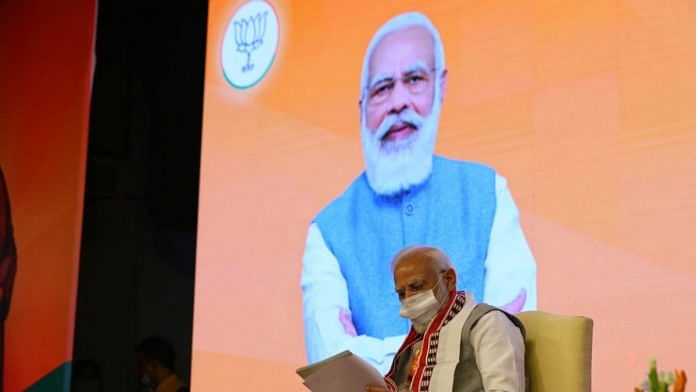New Delhi: In his concluding remarks at the BJP National Executive meeting held in New Delhi Sunday, Prime Minister Narendra Modi said party workers should become a bridge of faith for the common man. But this message did not come in isolation.
Modi’s statement was rooted in concern and caution, BJP leaders who attended the meeting told ThePrint, as he saw the party organisation become complacent when the second wave of Covid swept across the country.
In the course of his 50-minute speech, he narrated two stories to the 342 executive members who attended in hybrid mode (online and offline), to convey the message that election victories shouldn’t mean the party losing connect with the ground, and complacency should never come in the way of ‘seva’ (service).
Also read: BJP’s ‘all is well’ in the national executive is ignoring key party problems
‘In every tragedy, there is a ray of hope’
Near the beginning of his speech, PM Modi narrated one story from the days when he had just taken over as the chief minister of Gujarat in 2001, nine months after the devastating Kutch earthquake on Republic Day that year.
“He said he was clueless about how to go about restoring some sort of normalcy to people’s lives; had no experience of handling a state; he didn’t even know how constables worked or how the system worked,” a BJP leader said quoting Modi.
“He said, one day, he read a small story in a newspaper that people in the Kutch region were making purchases on the occasion of Dhanteras. That, the PM said, gave him an idea to forget what happened and start building for the future,” the leader continued.
There was a clear link between the PM invoking the vast scale of the tragedy in Kutch and what happened during the second Covid wave, the leader said, adding that “in every tragedy, there is a ray of hope” and the party and the government should act on that hope.
“The Covid devastation was huge, but the country’s mind can change if we act on time collectively. The PM said if today the world is praising India, it is not because of Modi, but because of the effort of the people who worked tirelessly to fight Covid,” the leader added.
The leader said Modi also mentioned how many people were saying it was impossible to vaccinate such a large population in such a short time, but “it was the people’s faith which paved the way” for 100 crore doses to be administered.
A second leader said Modi reminded the attendees that during the Covid wave, he would regularly call BJP workers in different states and ask about their well-being, and if they were facing some problems.
“He said one call from me made the workers happy, and they thought they are such important people that the PM has called them… BJP leaders should connect with common workers; they should ask about their well-being. It will strengthen the bond between party workers. It was because of three generations of their struggle that we have reached here,” this leader said.
Rishi Kumar Kaushal’s story
This theme of three generations of the Jana Sangh and BJP workers connecting with people cropped up a second time when Modi told the story of a Jana Sangh leader, Rishi Kumar Kaushal, from Jammu and Kashmir.
A third BJP leader in attendance, quoting the PM, told ThePrint: “During his days as BJP organisational general secretary (1998-2001), he worked with Kaushal. This gentleman had worked for the Jammu Praja Parishad and with Syama Prasad Mookerjee. He and his wife pledged that till the post of ‘prime minister’ of Jammu and Kashmir was not downgraded to chief minister, they would sleep on the ground.
“The PM said Kaushal always helped people without any self-interest, and that we should ever forget the fact that such people have contributed to the growth of the BJP. We should always be available for the seva of the people,” the leader said.
“Modi said we have changed the political culture of the country, and seva should be our ultimate goal. We are in government, so raising ‘zindabad’ or ‘murdabad’ slogans is not our duty. The government can’t do every work, but the party workers’ duty is to supplement the government’s work,” the leader added.
Significance of PM’s stories
Another BJP leader said the PM’s recounting of Kaushal’s story and his practice of calling people during the Covid pandemic was to send a message that the party was complacent at the time of the second wave in April-May, while the government was fighting crises like the shortage of oxygen cylinders and hospital beds.
“They became active only when the PM advised the BJP president to initiate seva work and check the public perception going against the government,” this leader said.
Modi also suggested many solutions that would strengthen the party at the ground level while doing the duties assigned to them.
“He recounted that during his interaction with his cabinet colleagues, he frequently asks ministers that apart from the ministries they are handling, what else are they doing for society? He said he has come to know that many ministers are doing a lot of good work, through NGOs and other means, and that we should not only back them but highlight their positive work. This will create positivity around the party,” the last-quoted leader said.
The leader added that the PM also stressed that the work of old BJP workers who played a crucial role in the growth of the party should also be documented.
“It will not only document history, but new party workers will know the struggles and the selfless work of the past generations,” the leader said.
(Edited by Shreyas Sharma)
Also read: Prashant Kishor’s prediction about BJP is bang on. India’s opposition has a lot to do with it



